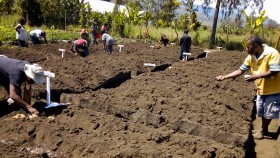Does language impact climate scepticism?
Despite the overwhelming majority of scientific research suggesting that climate-warming over the past century is due to human activities, there remains significant and vocal scepticism to the science.
Professor Mike Smithson of the ANU Research School of Psychology believes that this could partially be due to the wording used by the UN Intergovernmental Panel on Climate Change (IPCC).
Over the past four years Professor Smithson and his colleagues have conducted research into how people interpret expressions of uncertainty in official IPCC reports. He said the findings show that lay people are consistently misinterpreting scientific statements in the reports.
"The lay public is regarding the statement as much more uncertain than scientists are saying that it is," Professor Smithson said.
The research focussed on measuring people's interpretation of probability statements, such as 'very likely' or 'unlikely'. IPCC reports have guidelines that show precise percentages for probability statements. For example the term 'virtually certain' means between 99-100 per cent.
Professor Smithson was a member of a team led by Professor David Budescu at Fordham University in the United States. Their research showed that people's interpretation of these statements was considerably closer to 50 per cent than the intended meaning of the guidelines.
"These patterns held up very stably across 24 countries and 17 languages," he said.
"When people use expressions for uncertainty such as 'a good chance' they are consistent about their own meanings, but differ widely among each other.
"You will be self-consistent and so will I, but we may have quite different interpretations."
Professor Smithson believes this misunderstanding could have significant impacts on global climate policy.
"If people are regarding IPCC statements as closer to 50-50 than its authors intend, what that amounts to is people introducing more uncertainty than climate scientists are claiming," he said.
"It's possible that this misinterpretation could then affect policy makers either through being influenced by public opinion or through the same inference."
The research also looked at how the problem might be resolved. Half of the participants were tested with the IPCC guideline's percentages inserted into sentences to reduce people's reliance on personal interpretation.
"We found that including the numbers in the sentence did help. It didn't cure the problem but it did help," Professor Smithson said.
Professor Smithson said the IPCC could add further clarity to their reports by avoiding negatively phrased language.
"The tendency was actually exaggerated for negatively worded phrases," he said.
"I think the explanation for that is that in life, we tend to use negative phrasing to soften threatening statements. Instead of telling someone that they are cruel, we say they're not very kind. So when people see a negative phrase they are thrown into a quandary about how to interpret it."
The research is further outlined in a paper titled The interpretation of IPCC probabilistic statements around the world, first published in the Nature Climate Change journal in 2014.
An earlier related paper titled Never Say 'not:' Impact of negative wording in probability phrases on imprecise probability judgments, was published by the International Journal of Approximate Reasoning in 2012.










